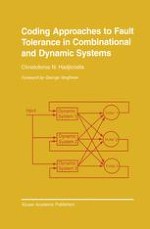2002 | OriginalPaper | Buchkapitel
Redundant Implementations of Linear Finite-State Machines
verfasst von : Christoforos N. Hadjicostis
Erschienen in: Coding Approaches to Fault Tolerance in Combinational and Dynamic Systems
Verlag: Springer US
Enthalten in: Professional Book Archive
Aktivieren Sie unsere intelligente Suche, um passende Fachinhalte oder Patente zu finden.
Wählen Sie Textabschnitte aus um mit Künstlicher Intelligenz passenden Patente zu finden. powered by
Markieren Sie Textabschnitte, um KI-gestützt weitere passende Inhalte zu finden. powered by
This chapter applies techniques similar to those of Chapter 5 to provide fault tolerance to linear finite-state machines (LFSM’s) [Hadjicostis, 1999]. The discussion focuses on linear encoding techniques and, as in Chapter 5, results in a complete characterization of the class of appropriate redundant implementations. It is shown that, for a given LFSM and a given linear encoding, there exists a variety of possible implementations and that different criteria can be used to choose the most desirable one [Hadjicostis, 2000; Hadjicostis and Verghese, 2002]. The implications of this approach are demonstrated by studying hardware implementations that use interconnections of 2-input XOR gates and single-bit memory elements (flip-flops). The redundancy in the state representation (which essentially appears as a linearly encoded binary vector) is used by an external, fault-free mechanism to perform concurrent error detection and correction at the end of each time step. The assumption of a fault-free error corrector is relaxed in Chapter 7.
